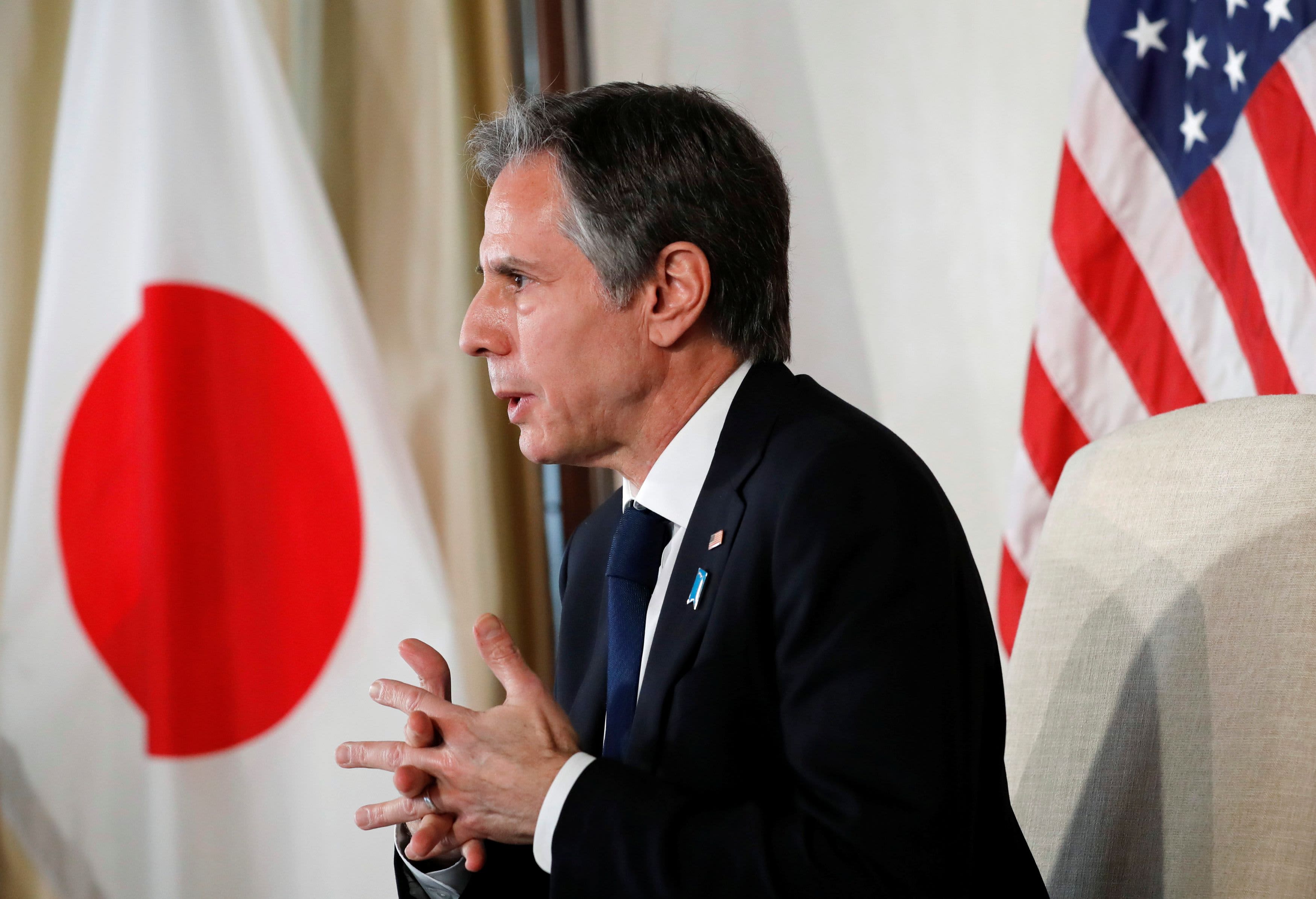WASHINGTON – On Japanese soil, Secretary of State Antony Blinken criticized the widespread use of “coercion and aggression” by China on the international stage and warned that the United States will counterattack, if necessary.
“China uses coercion and aggression to systematically erode autonomy in Hong Kong, undermine democracy in Taiwan, abuse human rights in Xinjiang and Tibet and enforce maritime claims in the South China Sea that violate international law,” said Blinken at a press conference.
“We are united in the vision of a free and open Indo-Pacific region, where countries follow the rules, cooperate whenever they can and resolve their differences peacefully. And in particular, we will step back, if necessary, when China uses coercion or aggression. to get what you want, “he added.
Blinken’s comments come a few days before he and national security adviser Jake Sullivan have high-level personal conversations with Chinese representatives. Blinken and Sullivan will meet with Yang Jiechi of the People’s Republic of China, a member of the Communist Party’s decision-making body, and Wang Yi, foreign minister, in Alaska.
Chinese Foreign Ministry spokesman Zhao Lijian said on Tuesday that Beijing hopes that a stronger relationship between the United States and Japan will not harm others in the region.
“We believe that cooperation and communication between Japan and the US should strengthen regional understanding and trust, it should be beneficial for cooperation between countries in the region and beneficial for peace and stability in the Asia-Pacific region, and not it must target no third parties or harm the interests of third parties, “he said during a news conference, according to an English translation.
President Joe Biden, who spoke to Chinese President Xi Jinping last month, had previously said that his approach to China would be different from that of his predecessor, as he would work more closely with the allies to mount a reaction against Beijing.
“We will face China’s economic abuses,” said Biden in a speech at the State Department, describing Beijing as the “most serious competitor” in the United States.
“But we are also ready to work with Beijing when it is in America’s interest to do so. We will compete in a position of strength by building better at home and working with our allies and partners.”
In February, Biden announced a new Department of Defense task force designed to assess the strategy of the US armed forces in China.
“This is how we will face China’s challenge and ensure that the American people win the competition in the future,” said Biden on his first visit as commander-in-chief to the Pentagon.
The country’s top diplomat and secretary of defense, Lloyd Austin, arrived in Tokyo on Tuesday in an effort to strengthen alliances and reaffirm commitments to major US partners in the region. On Wednesday, the pair will travel to Seoul, where they plan to discuss security cooperation and the challenges presented by China and North Korea. The joint trip of Blinken and Austin is their first trip abroad under the command of Biden.
US Secretary of State Antony Blinken, US Secretary of Defense Lloyd Austin, Japanese Minister of Foreign Affairs Toshimitsu Motegi and Japanese Minister of Defense Nobuo Kishi attend 2 + 2 Meeting at Iikura Guest House in Tokyo, Japan, on March 16, 2021.
Kim Kyung-Hoon | Reuters
Also on Tuesday, North Korea broke the silence for the first time since Biden became president and sent an aggressive message to the United States.
“We take this opportunity to alert the new United States administration that is striving to issue [gun] smell of gunpowder on our land, “said Kim Yo Jong, the powerful sister of North Korean leader Kim Jong Un, referring to joint US and South Korean military exercises in the region.
“If that [the U.S.] wants to sleep in peace for the next four years, it is better not to cause a bad smell in the first stage “, he added, according to an English translation.
The Biden government tried unsuccessfully to restart nuclear talks with North Korea.
Under the command of third-generation North Korean leader Kim Jong Un, the secluded state conducted its most powerful nuclear test, launched its first intercontinental ballistic missile and threatened to launch missiles into the waters close to the North American territory of Guam.
Since 2011, Kim has launched more than 100 missiles and conducted four nuclear weapons tests, which is more than his father, Kim Jong Il, and his grandfather, Kim Il Sung, launched over a period of 27 years.
He has not carried out any missile tests since Biden’s inauguration on January 20.
